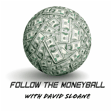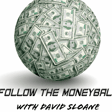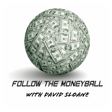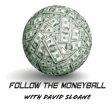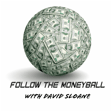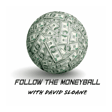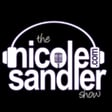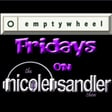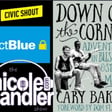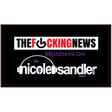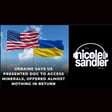Become a Creator today!Start creating today - Share your story with the world!
Start for free
00:00:00
00:00:01

FTMB EPISODE 5 -Greg Bouris President of Power x Communications
In this episode of "Follow the Moneyball" David interviews former Director of Communications for the Major League Baseball Players Association and current President of Power x Communications, Greg Bouris regarding his days at the MLBPA as well as his current roles with both Power x and as Director of Undergraduate Sport Management Program at Adelphi University.
Transcript
Introduction to 'Follow the Money Ball'
00:00:02
Speaker
Welcome to Follow the Money Ball, a podcast at the intersection of sports and money. Here's your host, David Sloan. I'm David Sloan and I have opinions.
David Sloan's MLB Agent Experience
00:00:13
Speaker
I also have 44 years of experience as an agent for MLB players that back those opinions up.
Meet Greg Burris
00:00:19
Speaker
My guest today is Greg Burris, who is currently the president at PowerX Communications. Welcome, Greg, and thank you for joining me today.
00:00:29
Speaker
David, thank you. Thanks for having me. I'm really excited to join you today and chat a little bit. If I can interject, in addition to running my own consulting company, I'm also the undergraduate Sport Management Program Director at Adelphi University here on Long Island. Yes, I noticed that as well in your CV on LinkedIn. And I'm going to get to that, no question about it. But as I've said,
00:00:54
Speaker
probably to the, to the ad nauseum response from my listeners. I always feel that it's best to start at the beginning. Um, and that's where I'd like to start with you. So, uh, where did you grow up?
Greg's Childhood and Passion for Sports
00:01:08
Speaker
Tuckett, Rhode Island, uh, baseball fans should know, uh, Kentucky Red Sox and going to those games as a, as a young kid, uh, certainly had an influence on my professional career. Sadly, they're no longer there. They're in Worcester.
00:01:23
Speaker
I know, I know that was, I think a huge mistake after, you know, having a thousand years of.
00:01:30
Speaker
connection to the community there for whatever reason, the geniuses that are currently running MLB decided to, to shut that franchise down. Um, sad day, a sad day for baseball, I believe. So you grew up watching those games and I'm assuming, uh, like, like most of us, uh, you were also, um, you played little league and then, uh, on from there. And that is what, uh, that you hooked at least as far as baseball was concerned, correct?
00:01:58
Speaker
Yeah, I loved all sports and played all sports. That was probably my downfall as an athlete. I feel like I'm pretty competitive in virtually any sport because we grew up in a different time, you know, and that's what you did. You rolled with the seasons. It was hockey season. We played street hockey. We'd rent the rink in our town and play ice hockey. We played football there, football season. And then when baseball came around, we spent a lot of time playing baseball, whether it was wiffle ball,
00:02:24
Speaker
organized baseball, boys club baseball. We couldn't get enough of baseball. So I have a passion for sports in general, and I was very happy that kind of the second half of my career, I spent almost 20 years working at probably the sports highest level of the Players Association.
00:02:42
Speaker
So you went from organized baseball to disorganized baseball.
Family Influence and Sports Gambling
00:02:45
Speaker
No, I'm just kidding. Um, so, um, did you come from a family that was, uh, oriented towards sports or was this something that, uh, you were the, the trailblazer in your family? Uh, from a profession in terms of being in the industry, a, probably a trailblazer. And I probably wouldn't share this with you if the Supreme court didn't roll differently in 2018. If it was, um, I grew up.
00:03:12
Speaker
and maybe sadly, in certain respects, in a family of sports gamblers. My dad was one of 11 children, his older brothers, he's the baby, the Depression-era kids. Pawtucket, Rhode Island, for some incredible reason, has this history of, somebody had sent me an article once where the phone company and the state police had rated like 125 gambling pollers in Pawtucket. It's not a big place.
00:03:43
Speaker
Yeah, my introduction to sports and it's probably why I funneled into it as a business because from a very early age, I grew up analyzing sports and learning things behind the scenes because my uncles, they were professional gamblers, bookmakers.
00:04:00
Speaker
Uh, and I learned, uh, in that environment, uh, again, at the time, not something that, uh, you'd be very proud of, uh, to go to school and a teacher would ask you if you were related to the Boris who was on the front page of the paper who was arrested in a sting operation. So.
00:04:18
Speaker
Be it as it may, it really trained me to kind of have a different eye on the sports world passion. I don't like gambling. I'm not a big fan of the legalized sports game because of the history. I could see what it can do to families. But I think I do have to, if you gave me truth serum, I do have to admit that that background was probably what propelled me
Greg's Youth Sports Experience
00:04:40
Speaker
to be passionate about this and want to pursue it as a business at a time when nobody really was doing that.
00:04:48
Speaker
Wow. That is quite a background. I'll have to say that, you know, I haven't run into anybody yet who can boast of that sort of launching pad, so to speak, into their career. So you continued to play throughout school and then you went to college in Massachusetts as well, correct? Well, yeah, I didn't.
00:05:15
Speaker
I didn't have a license. My family was divorced. So my sports was limited to some early youth leagues and then street games. I didn't play organized sports in high school because I really didn't. I'm not the kind of guy who's going to ask for things. So I wouldn't have a dependable right to practices and things like that. But I played sports virtually every day, whether it was pickup basketball, street hockey, whatever it was. So I always remained active athletically. I just didn't really pursue it.
00:05:46
Speaker
Organized in high school. I know my our football coach in high school who was also the baseball coach in our junior high school and we had a liking. When I got to high school, I didn't play high school football. He didn't talk to me until the day after the football season ended our senior year in high school. Then he said something to me and I was like, oh, I didn't know we were on speaking terms.
00:06:07
Speaker
was upset that I didn't play football. But after high school in Pawtucket, Rhode Island, if you're familiar with Pawtucket, it was a very
Early Career and Education Choices
00:06:17
Speaker
industrial town. It was the birthplace of the American Industrial Revolution going back to Samuel Slater and all of that history. So it's very blue collar. So after
00:06:26
Speaker
high school, I didn't go to college. I kind of applied to URI, University of Rhode Island. I got accepted, and then I got a bill. And I was like, well, who's going to pay for this bill? I don't think college is on my horizon. So I went down to the factory right down the end of my street, which was a bunch of big mills. And one of them I went to was called EF Rose, and it was a candy manufacturer, a candy company, big, big commercialized candy.
00:06:55
Speaker
So I got hired as the floor boy on the lollipop floor. And so that was what I did. You were one of the lollipop kids. Yeah, I was the floor boy in my whites and I was, you know, stacking pallets of lollipops to points unknown. And after doing that for a couple of months, I realized, you know, maybe this is not kind of my future. And then somebody turned me on to this concept of junior college, which I had no idea. And so for 250 bucks, I could go to junior college for a semester.
00:07:23
Speaker
I applied to Rhode Island Junior College, and that's what kind of whetted my appetite to pursue college even further. And so when I finished three semesters at Rhode Island Junior College, I wanted to start in a September at a four year school. And so I went to an advisor.
00:07:42
Speaker
And she said, well, what do you want to study? Well, we can look it up. And obviously, this was 1979, 1980, pre-internet. And I said, well, I love sports and I love business. Isn't there a way to mix the two? You know, aren't sports teams businesses? And she said, well, it would make sense to me.
00:08:01
Speaker
So to her credit, she dug in through some research and found, I don't know how she did it, like a needle in a haystack back then. She found that there was a college in Miami, Biscayne College, which is now St. Thomas University, that a couple of years prior became the first institution in America to launch a freestanding undergraduate sports administration program.
00:08:22
Speaker
So I said, well, if there's only one, that's where we're
St. Thomas University and UMass Amherst
00:08:25
Speaker
applying. So I applied to Biscayne College, was accepted. I didn't go on any school visit or anything like that. Got on the plane, went to the school.
00:08:35
Speaker
I fell in love with the coursework, intro to sport management, sports public relations, all of those topics. The campus itself, very, very small, but the Miami Dolphins trained there. So we would see Bob Greasy and Don Schuler. So the environment was for a very tiny school. It was exciting. The Baltimore Orioles had their spring training facility and fields there. So it kind of wet my appetite, but I really, as a New Englander, I didn't really take to living in South Florida.
00:09:03
Speaker
So I did a little more research and found out that UMass Amherst had a program called Department of Sports Studies, but it was buried under the FIZED program. And that's how the sport management programs evolved back in the late 70s. They were offshoots of FIZED programs.
00:09:19
Speaker
As physical education and budgets and running athletic departments started to become a little more sophisticated in the late 70s, those PE institutions realized maybe we should create a master's program to help these students come back with their PE degrees and get trained on the management of sports. And so that kind of created this whole next wave of sport management programs, sports administration programs to now with there's
00:09:45
Speaker
There's just numerous programs, but our generation, we were kind of the pioneers. There were no people ahead of us who sat in those seats and went through those programs and went out into the field. So it was quite adventurous and it was a lot. It was very exciting back in those days because we really weren't following in any path or footsteps. We were just trying to find our way in the industry. So a trailblazer once again.
00:10:11
Speaker
It was fine. That seems to be a pattern for you. Yeah. Um, my, I have somewhat of a connection with this game and St. Thomas. I recruited a player from Biscayne by the name of Dane Johnson. Um, he was a right-handed pitcher who the Blue Jays took in the second round. Unfortunately, I didn't get to represent him, but many years later, his son became a prospect and I tried to recruit him as well. And then, um, I don't try to remember when it was probably in the mid nineties, I think mid nineties to
00:10:40
Speaker
early 2000s, I was invited to come to St. Thomas and address their sports management, uh, class, which, uh, turned out to be interesting. They had some, some, uh, pretty interesting questions. Those kids, they were, they seem to be, um, on the ball. I recently had a situation where I, uh, addressed a sports management class at my alma mater, Arizona state, and those kids.
00:11:07
Speaker
It was funny because they had a Zoom set up like this and they had a camera in the front that was showing me. And I asked, can you set something up so I can see who's raising their hand with any questions? So they set up a camera in the back of the room. And so now I'm able to see what these kids are doing and they're there on their computers. They have to let them have their computers so they can, they're on their computers, on Facebook, on Reddit, on, you know, everything in the world, but what it was that I was talking about. So.
00:11:37
Speaker
Quite a contrast from those kids at St. Thomas. So, all right. So you, you go to UMass Amherst, uh, again, night and day difference from, from Biscayne and St. Thomas. And so then you, you, you get your degree from there. And then from there, uh, where was your next step?
NHL Internship and Early Career
00:11:55
Speaker
Well, I, you know, I'm a good listener, so I listened to other students and everybody had to do an internship before you got your degree undergrads and grads.
00:12:03
Speaker
And so in different classes, I would hear, especially the grad students, you know, oh, the commissioner's office in baseball has a couple of internships. I'm going to vie for that. And people were going to NBA and NFL. And at the time, you know, horse racing was still big. People were interested in para-mutuals and working at racetracks. Racquetball was a big thing. People were interested in going into careers in facilities.
00:12:27
Speaker
and management, but as I said, I loved all sports, so it really didn't matter where I went, and nobody was talking hockey. So I went to my advisor and said, hey, have we ever had anybody do an internship with the National Hockey League Office? And luckily, about a semester or two before me, they did. And they said, why are you interested in that? I said, yeah, I'm interested in anything, but that sounds like a good one. And so they called the NHL office and said, hey, you had one of our interns? Would you be interested in interviewing another one? And they said, yes.
00:13:00
Speaker
Amherst to New Jersey State with a buddy of mine from New Mass who lived in New Jersey. And in the morning of my interview, first time I had ever been in Manhattan, took a bus by myself from Newton, New Jersey out to the Port Authority aimed for the Empire State Building and hooked the left up Sixth Avenue to the NHL offices and managed to be offered that internship in the Public Relations Marketing Department. They were probably about
00:13:21
Speaker
And I took a bus ride down from
00:13:30
Speaker
15 employees at the nhl office at that time today i'm going to take a wild guess and say maybe there's 500 i could be uh shorting that i don't know but again the industry was just it was still kind of in its mom and pop phase which made it uh very exciting so uh the internship was without pay it was for credit they gave me commuting costs
00:13:51
Speaker
And housing was going to be a big issue. So when I graduated, I went back to Pawtucket, Rhode Island. I said, okay, how am I going to make this work? I kind of just jumped into this, not really thinking about having to live in Manhattan on no salary. So I ended up.
00:14:08
Speaker
doing what I could to save as much as I could. So I went to another factory job that summer, worked 11 o'clock at night till seven in the morning in a shoelace factory. I was a bobbin stripper, stripping threads off of bobbins. And then from there, I went and worked with the City of Pawtucket Recreation Department from 7.30 to 12.30 in the afternoon. And a friend of mine, his girlfriend's father, who had contracted Parkinson's, wanted his house painted. So I said, give me a few hundred bucks, I'll paint your house.
00:14:38
Speaker
And then I go home and sleep from about 4 to 10, 10, 30 and then go to go to work, save every penny I could. And I still really kind of didn't know where I was going to stay during my internship. And then as luck would have it, you need a lot of luck to be successful in any industry. I went to a bar one night and ran into a buddy who was who I worked with in the hospital. I was in junior college.
00:15:00
Speaker
And he was going to school at Fordham and we hadn't seen each other in a couple of years. We exchanged, you know, hey, what are you doing? What are you doing? He's still going to Fordham. Hey, I'm supposed to do this thing at the NHL in New York City. He was all hyped. I said, yeah, but I can't find a place to live. I may not be able to do it. And he said, do you mind sleeping on a couch? I said, I'll sleep on the floor. He said, well, we're living off campus this year. If you want to crash on a couch, you could come crash with us. My roommates won't mind.
00:15:26
Speaker
Thank you to my pal Dave Riccio there. That set up my abode which fit into the budget of not getting any salary. So I commuted from 185th in Southern Boulevard in the Bronx down the D train, walked up to the Grand Concourse down to
00:15:45
Speaker
Rockefeller Center and was in the middle of working in the NHL office, which was for me a kid from Pawtucket was you had to pinch me. I mean, I couldn't have scripted anything like this. It was like a dream. And for the next 39 years, almost 40 years at this stage, it's been it's been kind of dreamlike. Wow, that is quite a story. That is quite a story. And I know that later on, your your hockey journey brought you back down here to South Florida. You worked for the Panthers.
00:16:14
Speaker
who their arena now is about 15 minutes down the road from where I live. So, you know, I guess as my unofficial grandmother told me many years ago, you grow where you're planted. So you spent many years in hockey with how many different teams?
00:16:33
Speaker
After the NHL internship, and I was lucky, while I was at the NHL, we had hired a VP of communications from the Rangers to come over, John Halligan, the late John Halligan, a PR guru in the hockey industry, and he hooked me up with the Knicks. So I ended up working game nights for the New York Knicks and all college basketball games at the Garden, and that was for pay.
Knicks and Islanders Experience
00:16:54
Speaker
So I was getting about 25, 30 bucks a game.
00:16:56
Speaker
But that helped build my resume. And after the NHL kept me on beyond just the semester that I was initially supposed to serve my internship, they kept me on for the entire season. And then after my internship, 13 weeks expired. They then started paying me, I think it was five, six dollars an hour.
00:17:15
Speaker
So I was like high in the hog. Now I was rolling in dough, working in the city. But after the season, I had to go back home and did the old snail mail resume thing. And then luckily for me, I got a call from John Halligan at the NHL. So the New York Islanders who had just lost the Stanley Cup finals for the first time in five tries, were looking for a third person in their three person PR staff. Would I be interested? And I said, of course.
00:17:45
Speaker
And so they highly recommended me. I came down to Long Island for an interview and was hired, fortunately, by the New York Islanders. And for those who aren't into hockey history, the New York Islanders, this was 84. They just came off a run of 19 consecutive Stanley Cup playoff round victories, playoff round victories, four straight Stanley Cups in one round short of a fifth.
00:18:09
Speaker
So I was embraced and welcomed into this world. And I was surrounded by, I believe, seven future Hall of Fame athletes and administrators. So in 1984, the New York Islanders were pretty much the preeminent franchise pro sport franchise and all sports in America, given their success.
00:18:29
Speaker
On and off the on and off the the ice they were innovative as a business and bill tori the president general manager who ran the organization. And the head coach al arbor they took a liking to me i came at it with a different approach i study this stuff so i had some innovations some exciting ideas.
00:18:50
Speaker
And one of the other things that helped me when I first started my first day, my boss and the assistant, Les Wagger and Jill Knee, they pointed to some boxes in the corner and they said, we don't know what those do.
00:19:05
Speaker
The NHL sent them to us, and we figured we would just let you figure it out and do whatever the NHL needs us to do with those. Those boxes happened to contain IBM desktop computers, and this was the dawning of the IBM, the digital age. Nobody had a computer on their desk. People were still using typewriters.
00:19:23
Speaker
So having moved to Long Island and not really knowing anybody here other than the people I work with, I spent a lot of time after work figuring out how I can use this IBM desktop computer to help do what I want to do with the teams trying to do.
00:19:38
Speaker
Um, and this was pre windows, so everything was, you know, disk copy a colon backslash, all of that stuff. Um, and I managed to do some innovative things with it. And that got me a promotion after my 1st year to assistant director. And then I got a real big wake up call how the industry works. Um, I wasn't making a lot of money with the islanders 13,000 dollars. I was living in a 1 bedroom.
00:20:03
Speaker
bedroom in a house in Long Island. And my college bills were piling up and I had to pay them. So I had to go and look for either another job or get a raise. And the NHL reached out to me and said that they had an opening. Would I like to come back to the NHL PR department, work at the league? It would be a big bump in my pay. So I was excited. I said, this is just what I needed.
00:20:25
Speaker
And they said, well, if you're good with it and you want to do it, we have to have Steve Ryan, their VP, reach out to Bill Tory to get permission to talk to me. Right. That's the big thing. You know, Dave in sports, deep permission. Right. So so a couple of weeks ago by and I don't hear anything. So I call my contact to the NHL and I said, hey, what happened with that job? And they said, we still want you. But when Steve called Bill Tory, Bill Tory wouldn't let him talk to you.
00:20:51
Speaker
And I was like, he can't do that. I'm making $13,000, at this time, maybe $15,000, $16,000. I said, how can he do that? So I see Bill, and this is like a tour tour training camp. So I see Bill and I said, Mr. Tori, you know, very intimidated by, this is the guru, right? Mr. Tori, can I talk to you for a minute? And yeah, what do you want, kiddo? I said, you know, the NHL has reached out to me and he stopped me in my tracks. He said, kiddo, kiddo, I know where you're going. I know what you're going to say. And I'm going to tell you what I told them.
00:21:21
Speaker
I need to get through training camp. And as soon as I get through training camp, you and I will have a conversation and then you'll be entitled to do whatever you want. So just give me a, you know, give me another week or two and we'll chat. All right. Whatever that means. And so a couple of weeks go by and it may have been like the day of the waiver draft or whatever.
PR Director Role at Islanders
00:21:40
Speaker
And I'm at the office at the desktop computer doing something and the phone rings and it's Bill Torrey. Gregor is Les there, my boss Les Wagner. We played basketball together, loved him, he hired me. He's not in yet Les. Okay, when he gets here, tell him I want to see him. So, normal stuff bigger than he's giving him the waiver list or whatever. So, Les comes in, I said, Bill called, he wants you to stop by his office. So, Les goes out of the office.
00:22:03
Speaker
50 and 20 minutes go by, Les comes back out of the office and he stands next to me while I'm by the computer and he looks at me and he looked a little shaken. And he says, well, congratulations. I said, what are you talking about? He said, I guess you're the new PR director. They just let me go. And while he's sitting there saying that, I'm like, what the heck's happening? The phone rings. It's Bill Torrey. Gregor, come on down. I want to talk to you.
00:22:27
Speaker
Now I'm thinking, I'm the next one out the door, right? So I go down, I talk to Bill, and he said, Greg, you know, I talk to Al, I talk to the players, you know, they respect you, you know the game, you're a hard worker, we want to move in a different direction, and I'm going to let Les Wagner go, and I'm going to offer you the job if you want to take it, publicity director. I was 26 years old. I was the youngest PR director, I believe, in professional sports at that time.
00:22:53
Speaker
So totally over washed with a whole groundswell of emotions. But, you know, they were taking a shot at me or shot on me with me. And, you know, I welcome the opportunity. And that led to that was eighty six eighty seven stayed with the elders. Another.
00:23:10
Speaker
Six years or so and then went down to Florida with Bill Tory after sir after bill being told by a new ownership group Hey, we don't want you here and then me as just reporting to bill bill told me you're gonna follow me right out the door and we both did but the NHL expanded with the Disney and blockbuster and They had an opportunity to hire Bill Tory and Bill took me with him
00:23:35
Speaker
So when they moved you into that new position, they also gave you a raise from 15 grand to 16 grand. Yeah. I think it was bumped up to about 26,000 maybe, which was huge for me. Yeah. That was a big bump. That was a big bump. A 26 year old back then. Yeah. That was a big bump. So, so let me ask you this and I'm asking you out of, I will freely admit total ignorance.
00:24:01
Speaker
What are the duties of a PR director for a National Hockey League team and, you know, particularly at that time?
00:24:12
Speaker
Well, the good thing was at that time, this was again the dawning of the digital age. I had studied kind of this field. So I had a lot of ideas in innovation. And I wanted to use all this emerging computer stuff. So the way I attacked the business was different than how the business
00:24:31
Speaker
Sports PR directors was handled probably up to around that point up to that point most of them are older gentlemen you know the the fedora wearing you know cigar smoking PR a guy who's at practice with the beat writers and you know making sure they get all the tidbits give them some little info here they're writing press box passes and overseeing the press box and setting up interviews and all the normal media relations activities that we see even to this day and
00:25:01
Speaker
But I brought a little bit more of innovation to it. One of the first things I did, you might get a kick out of this, because I was studying this and this was a profession to me, I found it kind of odd and I learned pretty fast that at that time, early 80s,
00:25:16
Speaker
For many, it was very relaxed. There were a lot of people behind the scenes, a lot of hangers on, a lot of things that would just shake your head today by comparison that was going on. But I was a pro. I went to school for this. I want this to be a real business. And one thing that drove me crazy
00:25:35
Speaker
was that we would serve beer in the press box, right? And so we had a lot of people who would be given overflow seats, would sit in the press box, have their beer, their popcorn. And finally, when Bill promoted me after the first week or so, I said, Bill, you know what?
00:25:51
Speaker
What do you think if I take the beer out of the press box and he almost fell off his seat laughing? He was like, wait a minute, wait, wait, wait, wait. These were civilians you're talking about? These were not press people or anything related that these were civilians. Well, because the Islanders are selling out most of their games, the off-ice officials, like the gold judges and goal scorers, part of their compensation was they would get two tickets to every game.
00:26:15
Speaker
So they would give them to their friends, but after a while, they all said, hey, we're losing money on those seats. Let's just sit them. The press box was very big. Let's sit them at the end of the press box, right? So they would come, but media people too would come up and have a couple of pops, right? You know, the big keg there. And so I said, I just really want to get the,
00:26:34
Speaker
I want to get the beer out of the press box. And he says, go for it. It's your domain. He said, but boy, you talk about an aggressive first move. You're going to get a lot. You're going to make a lot of enemies real fast. They say, well, I'm not here to be liked. I just want to do my job. And I think we all need to be professional. He said, I don't disagree with you. So that's kind of how that started. But the press box was the big domain of the PR person at the time. Back then, hockey PR.
00:27:05
Speaker
directors didn't travel with the team. The home team handled the PR for the visiting team and the home team. You had to handle it. Really? Yeah. You had to position. He didn't do too much. They would send you their version of the media notes. You would incorporate it into your notes. They would send you the press list. You would write out the press box passes for their traveling party.
00:27:27
Speaker
If there was an injury, you'd go down and get an injury update from their trainer. If they wanted to give it to the visiting team, I mean, the home team, there was a lot of the same standard responsibilities of a media relations person that exist today existed existed back then. Now there's.
00:27:46
Speaker
obviously in certain markets, many more of them with the explosion of digital media and all the reporters then. However, with that said, back in the 1980s, if you know New York sports, especially with the Islanders being a dominant team, our press box was full with the New York Times, the Post, the Daily News, Staten Island Advance, papers from New Haven, New Jersey. They would be covering all the big major dailies would send two reporters at least to every game, a photographer at every game.
00:28:13
Speaker
It was big. A lot of competition between the tabloids in New York for information. So it was a lot more stressful, I think, back then for the PR directors because of the competition between the media. I don't get that sense. Maybe it exists today, but as an outsider, I don't get that same sense of competition cutthroat that goes on behind the scenes with the baseball reporters or other reporters today. I think it's a little less of that today, a little less competition, I think. Yeah, yeah, definitely.
00:28:44
Speaker
So, okay. So Islanders, Panthers, and then, um, you went from there on to other ventures.
00:28:53
Speaker
And talk about that for a moment, how that transition occurred and, you know, where that led
Joining Panthers and Viacom's Impact
00:28:59
Speaker
you, please. Okay. Well, taking the job with the Florida Panthers was exciting because I, when I left the Islanders, you know, John Pickett, who owned the Islanders, it was a cash cow for him now, right? He had paid his players. Well, he knew he was at a turning point. He either had to build a new building, which was going to be expensive or.
00:29:18
Speaker
He was going to sell the team and he had a hard time finding a buyer. So we were working for the last couple of years under austerity measures, right? We couldn't spend a lot of money, do a lot. And then when Bill gets hired and hires me as the third person by the Panthers, our owner is Wayne Isenga. And this guy is the entrepreneur of the moment taking Blockbuster from 16 stores to this national chain. He bought Spelling Entertainment. He was getting into movie production, television production.
00:29:46
Speaker
He had just started the Florida Marlins expansion team. He was about a half a year, a year away from buying the Miami Dolphins, right? So this was exciting. So I went down and I met with the Bill and Wayne.
00:30:02
Speaker
And Wayne had a huge vision and he was not gonna, there was austerity wasn't part of Wayne's vocabulary. And so it was awesome to be able to go down to South Florida in a very non-traditional hockey market with a blank slate and owner who wanted to make some noise. So for somebody with my background, my kind of insights and kind of predisposition to trying to be innovative and take on challenges, this was a great opportunity. But really what,
00:30:30
Speaker
pulled me in big time was the fact that Wayne's vision wasn't limited to owning a hockey team or a baseball team or a football team. Maybe you'll recall he wanted something to rival Disney, right? He called it Blockbuster Park. The media tabbed it to Wayne's World back in the day. So he envisioned eventually selling the Marlins, the Panthers, and the Dolphins back into Blockbuster, getting his money back.
00:30:56
Speaker
and then putting the professional franchises into Blockbuster Park, anchored by a Dome Stadium on one place, State of the Art Arena on the other, championship golf courses. Wayne was even into virtual reality in 1993, 1994. He was talking about doing something that would totally rival Disney. That's where his vision was.
00:31:15
Speaker
And then, unfortunately, I believe it was Viacom and Paramount were up for bid on ITT Sheridan, which owned the garden and some other things, or ITT Sheridan. Somehow there was a big acquisition at stake where some of the redstone came to Wayne and said, Wayne,
00:31:35
Speaker
Blockbusters a cash business. People come in and give you money every day. This bidding for this company is getting crazy. I need your cash. Blockbusters cash to kind of seal this deal. So you can either sell it to Viacom.
00:31:51
Speaker
peacefully or I'll do a hostile takeover and so kind of Wayne had to acquiesce and sell for the shareholders. He had to sell Blockbuster to Viacom and Wayne came in and God is my witness. We had a small group of the directors that he was close to and ran the operation for him. He came in and he was shedding tears when he told us that you know you were here for something bigger. I know that
00:32:14
Speaker
but I'm sure that some of the Redstone is not really gonna have Blockbuster Park on his agenda the way I did. So that was kind of the beginning of the end of Wayne's ownership in those franchises. So he then, he went all in on the Marlins, won a World Series, and then he cashed out and everybody ridiculed him, but they shouldn't have. I mean, brought a World Series to South Florida. The Panthers went to,
00:32:41
Speaker
The Stanley Cup finals in only the third year, he wanted a new arena. They were going to send me to Nashville, which had an arena but no team because we were talking about maybe moving to Nashville and I would go out a year advance and get things going there. But Wayne was a genius. Once the team went to the Stanley Cup finals, he knew there'd be so much public anger if the Panthers left that he even took the team public and made about $145 million in an IPO.
00:33:10
Speaker
And he eventually peeled it back, sold the Panthers, and he eventually sold the Marlins, kept about maybe 10%, because his wife, Marty, she loved the Dolphins. And that was his kind of exit strategy from sports, as if he had never been there. And he had great dreams and great vision. So I was there in that environment.
00:33:31
Speaker
for three and a half years. But we got to the Stanley Cup finals in our third year, which was great. We got a shovel in the ground for New Arena. I had just gotten married. We were expecting our first baby and my wife was from Long Island. I'm a New Englander. I said, you know what? Our job's done here. There's not much more we can do except win the Stanley Cup and that could take you forever. So I started my own exit strategy and ended up getting a job with Sports Channel New York back here in Long Island. Folks I had known when I worked with the Islanders.
Sports Channel NY and MLBPA
00:33:58
Speaker
a regional sports network that then was melded in. Chuck Dolan Company melded back in with MSG Network and spent about a year, year and a half in that Cablevision rainbow media world. But I was back on solid footing in New York, up in the Northeast where I wanted to be. And then after that merger with Sports Channel New York and MSG, Sports Channel said, well, we're going to let the MSG PR people run, MSG PR.
00:34:23
Speaker
Would you be willing to go back to New England and be the GM of Sports Channel New England and was enticing offer. But I had just gone through so many changes in my life. I wanted to stay here on Long Island and I ended up working for a complete shift.
00:34:39
Speaker
working for the CEO of 1-800-Flowers, Jim McCann, who was the next entrepreneur of the moment, taking the 1-800 telephone concept and melding it with this new emerging internet in e-commerce. He was one of the leaders in the e-commerce space. It was great to be
00:34:57
Speaker
In the saddle kind of with Wayne doing that Wayne with Jim doing a lot of his personal public relations speech writing Traveled around to all types of speaking engagements in the corporate world now So now we were traveling in different circles and while I was there a recruiter reached out about a job with the MLB Players Association, right? I was like, whoa, I'm a management guy. They probably won't even let me in the door But lo and behold I did get an interview with the MLB PA and
00:35:27
Speaker
Believe it or not, I didn't think I'd be hired, but I was hired. That's quite a journey. Wow. I have to admit, I've talked to a lot of people. I don't know too many who had that kind of ride.
00:35:45
Speaker
Um, you, you definitely had some good fortune. Um, talking to Greg Boris today, uh, president of our ex communications and also professor of, uh, sports management at Adelphi university. And so now we're at the point where you got in contact where actually they got in contact with you from the major league baseball players association. What year was that? 1999.
00:36:11
Speaker
Oh, okay. So you missed out on the 94 strike. That was tremendous fun. That's why I was hired. Really? Yeah. Explain that please. Yeah. Well, I definitely like to hear it. I'm sure my listeners would as well. Well, how long have you been an agent for?
00:36:30
Speaker
um since 1974. Okay so you you you know all of this that you know Marvin Miller right he ran the union um Dick Moss and then when Marvin stepped aside Don Fear did and and you can't argue when you think about it and I'm sure you probably agreed and you probably heard and read this or heard it explained to you in agents meetings confidential agents meetings that when it came to public relations what the public thinks
00:36:58
Speaker
doesn't matter in the eyes of union leadership. You know, they have a fiduciary responsibility to its union members.
Improving MLBPA's Image
00:37:05
Speaker
They cannot go out, as Don Fairwood has always liked to say, you know, we can't take straw polls on the street to see which way we're going to go in bargaining. We can't do that, right? We'll be sued by our members. So yes, you know, we understand media and public relations, but
00:37:19
Speaker
We don't have the assets. We don't have the money to offset what MLB has in the PR game. So it's a game that would just be futile. We'll never win that game. And the players get beat up anyway. So coming out of the 232-day strike, the players, I think, were a little fed up that they were the bad guys. And they didn't understand why are we always the bad guys.
00:37:45
Speaker
Nobody thinks the owners are bad guys. And no matter how often you try to explain it to them, the owners are always going to be seen as being owners. They do what the owners do. You're the boy next door. You're not supposed to be that guy and so on and so forth.
00:37:58
Speaker
But with that said, I think the players really went to Don and Judy Heater who ran their business side. We want to be in the PR space. We want at least to have something collectively, not individually, not to do the stuff that the teams do, but something collectively.
00:38:16
Speaker
And so they did a search for, I think there was somebody hired just before me, but didn't last very long. Don didn't get along with him and he was pushed aside. And so it was maybe a failed attempt at something they wanted to do, but they went back at it to their credit.
00:38:33
Speaker
And after a lengthy interview process, they hired me, I think mainly maybe because I had the team experience. I knew how teams functioned. I knew how athletes functioned. I also had that TV experience and I just came from kind of this emerging internet piece that was unknown to most people there with the 1800flowers.com. So they hired me to be kind of launch or run their first full-fledged communications department.
00:39:01
Speaker
Um, and really at the end of the day, what my job really entailed was trying to change the narrative and reshape the reputation and image of a major league baseball player. Uh, it was pretty low at that point in the late nineties. Uh, a lot of scars, a lot of wounds to heal, uh, coming off of that strike. So, uh, pardon me for interrupting, but it wasn't just the strike. I mean, there was the, the cocaine trials that took place and then
00:39:27
Speaker
Just the, the, the myriad other issues that had come along in that period of time to, for lack of a better term, sully the reputation of players. And I think another big problem that, that, that existed was so many people, when they looked at, um, baseball players, it's like, Oh, I did that.
00:39:49
Speaker
I didn't do it in the majors, but I played little league or I played high school ball, but not very many of them owned a billion dollar trucking company, or in the case of Huizinga, a billion dollar video company. So it was easier to say, you know, Hey, if I hadn't injured my knee in high school, I might've played in the big leagues, but it's kind of tough to say if I hadn't injured my knee in high school, I would have been a billionaire.
00:40:14
Speaker
So I think that was a big part of the issue in terms of the players. I think another thing was Don Fair was very good at his job and Don Fair was an attorney and his background was in labor negotiations and Don was very good at that. In my opinion, not as good as Marvin, but nonetheless, very, very good at what he did. However, Don was not a warm and fuzzy kind of guy.
00:40:41
Speaker
And neither was his number two gene Orza. As a matter of fact, the call gene Orza abrasive would be to say, Shaquille O'Neal is tall. And that being said, when there were labor negotiations going on.
00:41:01
Speaker
and there needed to be a spokesperson for the union and you got Don Fear or you got Gene Orza versus the people that the big guns at the owners' collective bargaining unit had hired
00:41:16
Speaker
It was really a mismatch. So I, I, I agreed at the time. And obviously I think now it's, it's even more apparent that bringing you on board was a, a very, very good move for the MLB PA. Um, my question that, that maybe I'm jumping ahead. I'm wise. And I do want to go back to some of the issues that you had to deal with while you were there. Why did they ever let you go?
00:41:44
Speaker
Because I, and I'm not saying this to blow smoke up your ass, Greg. There's no reason to do that. I don't think since you've left, they've done nearly as effective a job as you did when you were there. I think that there are a lot of places where they flat out drop the ball.
00:42:08
Speaker
in the probably three most recent negotiations of the collective bargaining agreement, at least the last two. And that being said, I think they should have kept you. I don't know why they didn't. That insinuates or implies that I wanted to stay.
00:42:31
Speaker
They should have made you an offer you couldn't refuse. I'm not patronizing you. I appreciate that. I really do. But it wasn't their choice. This was my choice. I was highly paid. I was very well paid. It wasn't about money. For me, I had
00:42:50
Speaker
You know, as an outsider in the industry, you know, I'm a student of this industry, but a student of this industry since I was a kid. And, you know, I know the union, I know Marvin, I know the history, the power, the influence the MLBPA had. And it was great to go and sit.
00:43:11
Speaker
during the interview process. And I had even met Don when I was with the Islanders. I went in to chat with him about PR and he kind of cut the Alan Price who worked with me at the NHL. She was there and said, oh, you don't have any PR people. Why don't you come in and talk to Don? I did. And Don told me then in the late 80s, like, why do we need PR? I don't need PR. The owners have this much money up here. My job is to get as much as that down here for my players. End of story.
00:43:37
Speaker
So it was ironic that 10 years later, I'm hired by the union, but so much had changed. But my jumping ahead, what kind of pushed me out the door, and you alluded to some of this after, unfortunately, Michael Weiner passed and Tony took over. And I like Tony. I really respected Tony. Tony worked for us for a long time. I worked closely with Tony in this transition as executive director, did what I could to help him.
00:44:06
Speaker
But the philosophy was starting to change at the Union. And again, what attracted me to the job in the beginning, and I heard from my media friends when I was interviewing for this job, well, you're crazy. Why are you going to go work there? Oh, you're crazy. You'll be successful if you can even get Don and Jean on the phone for a media person. And so I took it as a challenge, and we did a lot. We really improved
00:44:29
Speaker
over my tenure. But what really attracted me there was the things you read about Don and Gene when they talked publicly, it was about principles. And all the decisions lied upon just being principled and doing what was right for the players.
MLBPA's Direction and Departure
00:44:45
Speaker
And I really loved being and hearing that, and that's how they operated. Every nickel coming in was going to go out to the players. It was a lean operation, and it was just about the players, the players, the players.
00:44:59
Speaker
things started to change with tony and we lost some of these little battles that we didn't lose in the past so they were starting to be some little cracks
00:45:08
Speaker
And in my role as communications, you know, I'm in charge of, you know, managing the messaging and doing certain things. And a couple of things happen. I will share all of them. But one thing happened when I left kind of abruptly and shouldn't have been a surprise to some folks there in February of 2018 was when the players were having a real hard time getting contract offers.
00:45:31
Speaker
A lot of the offers were coming in. They were similar. The players were starting to get angry. The agents were starting to go a little rogue with social media now on the horizon, issuing certain things and things that never would have occurred under Michael, Don, or Jean's tenure. They had conference calls with the players. Players were irate with Tony. We got to figure this out. What's going on? And so I would have meetings not with Tony, but with an intermediary and say, OK, we got to come up. What do you think? What do you think?
00:46:01
Speaker
And so finally, I added enough and say, you know what, we got to go back to the old ways. What's the muscle of this union, to use Marvin Miller's term, a Don term, a Michael term. The muscle is the players. So why don't we get the players here, the players who were on that conference call. Let's get them into New York.
00:46:18
Speaker
before spring training, we'll have a meeting here, and then wink and a nod, I'll make sure the media knows that we're marching from our office on 48th Street over to Park Avenue with 20 irate, all-star, future Hall of Fame baseball players to ask Rob, what's going on here, Rob? It's always been said at the union, no matter how many union lawyers are in a meeting, they don't get very far until a player shows up.
00:46:46
Speaker
And then the dynamic changes. Now all of a sudden you've got the talent, the product in the room, and it gets a little tougher for the commissioner and his designees. And so that was what I wanted to do. I said, look, we need to flex. We need to flex our muscles. We're going to say, we may not be able to change the CBA, but this should be a warning sign that this is not good. We're not going to put up with it. And I was told, no, we can't do that. And then I was told, can you find dirt on Rob Manford?
00:47:14
Speaker
Seriously? Seriously. And I was like, I said to myself, that's it. I'm out. I never knew that. I never knew that. I said, I can't play that game. My career up to that point, I'm 58 years old. I've been soaring with Eagles for, luckily.
00:47:32
Speaker
in their exhaust, right? Luckily to be dragged along here. And I just could not see myself stooping to these kind of measures. So that's why I said, you know what? You can either be nice and give me a nice little severance package and I'll go on my way. If not, I'm just going to cut it. I cut it. I was probably the dumbest man in sports. I walked away from a big salary after 19 years of the Players Association without a nickel in severance.
00:48:01
Speaker
Well, but with your integrity intact. Yes, that's more important to me. Look, I started my career in 1974, which happened to be the first year of free agency. And if you could go back and look at all of the press that took place then, and again, it wasn't the intense coverage that has taken place recently, but if you go back and look at all the press back then and from then until I don't know what would be the end point.
00:48:29
Speaker
Marvin always had players involved. I mean, if you look at the pictures of him, um, when, when free agency, when they won the court case, it was Marvin and Dave McNally and Andy Messer Smith being pictured there. And it wasn't just for window dressing. They were directly involved and Marvin always did that. Marvin always did that. And Don, Don did it too, to a lesser degree. Um, but I think again, Don's,
00:49:00
Speaker
Marvin was a labor union guy. He came from the steelworkers union and he knew what he was up against and figured how to deal with it very, very skillfully. Don was going to meet the owners in court and that's a lawyer's mindset as opposed to a labor leader's mindset. And while it was effective,
00:49:29
Speaker
to a degree, it wasn't as effective as it had been originally. So you lost a little bit, going from Marvin to Don. And then, you know, there was the Ken Moffat experience, which was a joke after Don left. And then from there, eventually, I guess Jean Orsa didn't want the job.
00:49:54
Speaker
And then it went to Michael Weiner and Michael had come in as, as kind of a junior partner, if you will. And my opinion, Michael was a really nice guy, really nice guy, very intelligent man. Michael was more of an academic and from my experience working with him as an agent in regard to issues regarding my clients and then the labor negotiations,
00:50:23
Speaker
Michael's biggest problem was he didn't want to make any enemies. He didn't want to alienate anyone on the other side. He wanted everyone to like him. And you can't do that in that position. You're in a position where, you know, as you mentioned with Don, everything had to be for the players and kind of dam the torpedoes, full speed ahead, sort of thing. Michael, that wasn't his ethos.
00:50:51
Speaker
And that being said, again, there was a bit loss and then Michael's illness took, took effect on him. And now instead of there being one voice, um, I would call in one time about an issue and I would get one person and I would call in another time about another issue and I would get a different person.
00:51:12
Speaker
And the second person's opinion would conflict with the first person's opinion. And it was like, okay, who do I talk to, to, to get the straight shit, so to speak. And that was never available.
Post-MLBPA Career in Academia
00:51:25
Speaker
And then after Michael passed away, um, it just, there was, there was more lost. So if you look at the union today and, and what it is and what it's able to do compared to.
00:51:40
Speaker
back in the day, the original way the union operated, it's a night and day different operation. And what you just told the story that you just told, I think, is emblematic of that. That ask of you to find dirt on Rob Manfred, Marvin never would have done that. Don Fair never would have done that. I can't imagine Michael ever doing that, never in a million years. And
00:52:10
Speaker
If that doesn't say everything that needs to be said about that chapter of the MLBPA, I don't know what would. So, okay, so now you walk from the MLBPA and you walk to forming your own company? Yeah. I knew at this stage at 58, you know, what am I going to do? I knew the day I took the MLBPA job that I likely
00:52:36
Speaker
And it was even communicated to me by one of the people the MLB PI interviewed with, you know, the MLB PA in 1999. And prior to that, you know, that was in sports, that's public enemy number one. Right. So most powerful organization and probably in the history of sports at that time. And most, most effective unit on the face of the earth.
00:52:58
Speaker
Yeah, and so I kind of knew having spent 15 years of my career on the management side that once I once I step foot in the door of the office as an employee, I can kiss goodbye any chance of ever probably resurfacing on the team side.
00:53:16
Speaker
uh because i spent nineteen years beating up owners and going after them and going counter a lot of it was quiet a lot of was behind the scenes a lot of was very strategic with certain tactics and you know doing some things just to get the players message out there um you know calling out the orders where they need to be called out that you know i knew at 58 there aren't many unions for me
00:53:40
Speaker
to kind of go look for a job, and I doubt any team in America would hire me. Really, you think so? I mean, I can understand you feeling that a baseball team might not hire you, but
00:53:55
Speaker
hockey wouldn't have, have entertained, uh, bringing you back or, or football. I don't have any concrete proof. Just my gut, just my gut instinct is that all these other teams and leagues, they know who's doing what and everybody pays attention. They know who I am now at 20 years at the union. They could just do a Google search and see me and the things I'm saying in the press and doing, and it, and not to say they wouldn't want me for my skill, perhaps in my experience and what I can bring to the table, but it might not be a good look.
00:54:25
Speaker
perhaps for a certain organization to bring in this union guy to come into our team here. I'm sorry, I think it would be the opposite. I think that they would want someone who had the knowledge of how things operated on that side, simply because you'd be able to give them more insight on how to counter
00:54:47
Speaker
the strengths that whatever, you know, the union, whether, whether you had gone to work for an NBA team or whatever, um, that, that, that union would have been bringing forward in, in negotiations, but their loss and your gain, because now you're able to work for yourself and not, you're not having to deal with, uh, taking orders from anybody or having your, your path forward, charted by anybody but yourself and where you wanted to live and what you wanted to do.
00:55:14
Speaker
Well, that's the big part of it. And, you know, I knew if I was going to get back on the team side, that would mean it could take me to Seattle. It could take me to wherever. And, you know, at this stage of my life in 58, you know, I was thinking, you know, I want to stay here. And what I really wanted to do.
00:55:32
Speaker
and going back to where we started in terms of my beginning academically, because when I was a student at Biscayne, there were no people like me who could come back and speak to us like you speak to students today. There was nobody who went and sat and got a degree in Sport Management when I was a student who could come back and tell us what it was like. So I made a vow to myself when I was 20 years old that if I was ever lucky enough to get a job in this business, and they told us we were going to get a job in this business because it was so competitive,
00:56:01
Speaker
that I would save part of my useful life to step up my academic contributions. So when I left the MLBPA, that was my mission was to be a consultant, but take on more academic responsibilities. Luckily, I had been an adjunct professor at Adelphi for about 20 years up to that stage, teaching a communications media relations class at the grad level.
00:56:23
Speaker
And they had an opening coincide with the year after I left to become a full time lecturer, which is I teach four classes a semester. And they also asked me if I would be they had a gap in program director. So they asked if I would be the program director. So the last four years, that's what I've been doing with my consulting work.
00:56:43
Speaker
In my academic, I can only hold about 3 or 4 clients on the consulting. I wish I could do more, but I can't because I do dedicate a lot of my time to the academic side. I find greater solace and greater satisfaction being able to have influence over 100 and some odd sport management majors and taking them behind the curtain.
00:57:06
Speaker
I teach sound theory of the classes I teach, but what I kind of offer too is take that theory, apply it to what we see in the headlines every day, and then take people behind the scenes. Take these students behind the scenes during a collective bargaining or a grievance procedure and say, okay, I've been in those rooms. Here's what's happening. Here's what you're reading. It's resize to every story, right? And so that really is, I think, if there's anything I leave on the table here at the end of the day, is that
00:57:33
Speaker
I want to take what I've been able to gather over the last 40 years and share that with others who may want to follow in the footsteps of me and people like me. Yeah. Yeah. So compared to the Greg Boris who showed up in Miami with no clue as to what the area was like and really no path blazed for them, what is that Greg Boris like compared to the students that you're teaching now at Adelphi?
00:58:00
Speaker
Very different, right? I came in not knowing, right? There was no path. These students come in when you ask them. So one of the first questions I asked when a new student comes in or I have an open house and somebody wants to do, you know, study sport management, I said, what would you like to do? And they said, I'd love to be the general manager of the New York Mets, you know.
00:58:21
Speaker
And I say, all right. Okay. How many of those jobs are there? There's one. Okay. All right. I said, well, okay. I'm not going to poke a hole in your dream because that's, I had dreams. All right. And my dreams came true to hard work. So I hope that's your goal, but there are going to be a lot of steps you could have to take before that.
00:58:43
Speaker
Right. You got to learn a little bit more and blah, blah, blah. So I think the students today, because they see so much of the industry and the opportunities today, you know, when I was starting out, when I was with the islanders publicity director, you know, I was serving, you know, I showed.
00:58:59
Speaker
the staff directory in my intro to sport management class. We had 32 people on staff, the New York Islanders, when I was PR director, then I put up their staff directory and it's on multiple pages on the internet. And I said, look, there's a lot of opportunities. So the difference, we had no clue. And if you go back to the eighties, the way professional sports teams were structured in realistic terms, almost in every sport, you had an owner, owners,
00:59:27
Speaker
Maybe you had a president, but maybe not you had a general manager. The general manager was the boss and then under the general manager, you had maybe somebody who was ahead of business and their main priority was ticket sales. That's it. There was no marketing department.
00:59:43
Speaker
There was no sales department, maybe some ticket sales people, no sponsorships, no promotions, social media, whatever it is now, publications, all this. The main person on staff underneath the general manager was the public relations person.
01:00:00
Speaker
sports marketing as a term wasn't even kicked around until I believe 1978. So when I came in, sports marketing, people had marketing positions were starting to emerge. I took my public relations mindset and philosophy was more like a marketer. I wasn't going to be just this
01:00:19
Speaker
plaid, fedora, cigar-smoking guy, I wanted to use PR more strategically. I wanted to be a key messenger. I wanted to use technology. I wanted to build audiences. I wanted to work with the media and help them do their job, but understand I'm not going to help you do your job to hurt me. I'm going to help you do your job to do the things I want you to do for me, right? So I kind of went out and kind of created that. Today, these students have a palette.
01:00:45
Speaker
of opportunities they could look at. And I say, you know, to parents especially, when they say, why should my student, my son or daughter, study sport management? I say, why? Because today, if your student, if your child is interested in graphic design, law, nutrition, public relations, social media, videography, video editing, website control, marketing, sponsorship, sales,
01:01:11
Speaker
I'll give you a list of 50 different things. There's a role in sports for you, right? It covers virtually every aspect of anybody's career, interest you could have, accounting, human resources, diversity and inclusion. I mean, there's a role for everybody today. Back then, when I was doing this, there was one job that was PR or you could work in a sales department on commission. That was it. Yeah.
01:01:37
Speaker
True. I mean, they didn't even have chief financial officers back then. When I first started back in 1974, so many people had jobs based on who were their drinking buddies. Seriously. I mean, I'll give you a good example. Um, Bob Lurie, who was the owner of the San Francisco Giants when I represented consecutive nationally rookies of the year for their team. Um, the, the, the guy who became the general manager, their spec Richardson, um, he started off in ticket sales.
01:02:07
Speaker
Um, and he was pretty much constantly drunk as far as I could tell from every time I was in his presence, he smelled like a bar. And that being said, he knew the right people now. I mean, I haven't read the players since 2018, so more than five years, but the, the teen people who I was encountering toward the end of that phase of my career were much more academics.
01:02:36
Speaker
than they were baseball people. I think that they need to have a good mix in order to really come up with the best end result for the team and also for the fans. I think you put a better team on the field and have a better experience in the stands and also of equal or greater importance, your presence in the media, whether it's online, TV, whatever the case may be. So the kids you're teaching now are much more sophisticated than you were
01:03:03
Speaker
How about their level of education? And the reason that I'm asking this is that it seems like education in general in this country has been severely dumbed down. You know, now, despite the fact that, I mean, when I was in high school, there were no AP courses. So you've got kids who are graduating with college courses who, who don't know the difference between YOUR and YOU apostrophe RE.
01:03:29
Speaker
And, you know, little things like that, that, that really jump out, despite the fact that they have thousand times the resources that they did in the stone ages when I went to school or later on when you went to school. And, you know, that being said, who you feel that the students you are teaching now will be as prepared, let's call it.
01:03:53
Speaker
when they exit your program as you were and handle whatever challenges awaited you in the course of your career path. I think in many respects they'll be better prepared only because we live in such a powerful information age that as long as you have a cell phone, right, you can do most anything and find the answer to almost any question or direction or advice. But are they capable of using that information? I mean, yeah, you can get a lot of information, but if you don't
01:04:23
Speaker
have the capability of really utilizing that information properly, the information's useless, right? Yes. What I find with the students in sport management and those that I have that aren't sport management students, and I don't know if it's any different generationally, but you're going to have some students who college is just an extension of high school.
01:04:47
Speaker
And they're there because this is the next step. They could be athletes. Hey, I'm here because I want to play lacrosse. And hey, I figured, hey, I play lacrosse. I'll study sport management, right?
01:04:58
Speaker
That's the way it is. Others, though, on the high end here, they come in and they're motivated, and they want to learn, and they ask questions, and they get involved. And the student, and I harp on this from the day they step put on campus, don't wait till you leave, because then it's too late. And what I tell every student and their parents when I sit down and talk to them for the first time, I said, I want you to come into Adelphi envisioning yourself not going to college, but going to Home Depot.
01:05:27
Speaker
Right. And you're walking into Home Depot with a tool belt and you don't have any tools in it because you don't know what you're going to build yet. And right now you're going to come to Adelphi and you don't know what career you're going to build yet. But after the first year, after the second year, all of that should come into focus and we're going to spend time
01:05:44
Speaker
Picking the classes that are right for you to put these tools in the tool belt so when you leave here on graduation day. We work together to figure out what you think you want to do and we've loaded up your tool belt with those tools and they'll be different for different. Students one example I use for the students you want to go into public relations media relations communications for a team or a league.
01:06:07
Speaker
Adelphi is not a sport management class. Adelphi operates or has a drone photography class. I said, you're going to take that class as an elective because you put that on a resume coming from somebody who hired people like you. If I see that on a resume, you go into the top of the pile.
01:06:23
Speaker
Because wow, now I have somebody who's got their FAA drone license and can operate our drone for our events and other things. So that's kind of what the mindset I tell the students. I'm going to do, and we're going to do our best to give you the right curriculum. I modified the curriculum when I was there to make it more contemporary. But I also tell students, look in the mirror. Where are you weak? I think you could use a little more skill thinking out of the box. So I think next semester, you should take the comedy improv class.
01:06:53
Speaker
It's going to get you to think on your feet, react and respond. You need to take the acting class because I want you to come out of your shell, things like that. So I think students today have people like me who are more in tune to, I think you get more one-on-one, I didn't get any of that one-on-one stuff in college, but I think today most colleges are looking at it that way. It's about, we know what you're going to get in the classroom, but we want to get you closer to experiences.
01:07:21
Speaker
We want to get you closer to people in the business so you can hear what they've gone through. And we want to handpick the classes beyond your requirements that are going to help you succeed. And I tell students, you know, you may love French wine and maybe there's a French wine class and you're paying. Take that class if you really want to. But if it's French wine versus drone photography, maybe you want to take the drone photography class.
01:07:44
Speaker
Greg Boris, president of PowerX Communications, professor at Adelphi University. I appreciate you coming on today. Appreciate it. Thank you very much, David. And that's it for another edition of Follow the Money Ball with your host, David Sloan. To make a comment or a suggestion for a future guest, reach out to David at followthemoneyball.substaff.com. Thanks for listening. See you next time.
